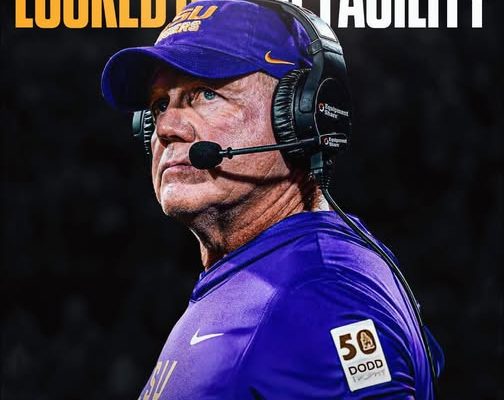The morning in Baton Rouge began like any other — the hum of anticipation around LSU’s football facility, players filtering into the training center, and staff preparing for another critical day in a season defined by pressure. But this particular morning took a turn that few could have imagined. According to multiple reports, LSU head coach Brian Kelly’s fingerprint was denied at the facility’s biometric entry system — a surreal, almost symbolic moment that encapsulated the growing tension surrounding the Tigers’ embattled program.
What might seem like a technical glitch quickly spiraled into something larger. Players, assistants, and onlookers watched as Kelly stood momentarily outside the door, trying multiple times to gain entry before security manually let him in. It was a small incident, but in the volatile atmosphere around LSU football, it became the spark for widespread speculation about the state of affairs inside the building. For many, it was a sign — a metaphor for how disconnected Kelly’s leadership has become from the pulse of the team he was hired to command.
Brian Kelly arrived at LSU in December 2021 with fanfare and expectation. After a decade of consistent success at Notre Dame, he was seen as the man who could bring structure, toughness, and championship pedigree to a program that had drifted since its 2019 title run. His arrival came with a record-setting $100 million contract and the belief that LSU had secured a coach capable of restoring the Tigers to perennial dominance in the SEC. But three seasons in, that vision feels increasingly uncertain.
Behind the scenes, reports of friction between Kelly and both his staff and players have grown louder. The once-tight operation that LSU prided itself on has begun to show cracks. The fingerprint denial incident became a public reminder of that divide — a trivial moment that spoke volumes about a larger disconnection. Sources inside the program have described communication breakdowns, wavering locker-room morale, and uncertainty about leadership.
In the world of college football, optics matter. When a coach of Kelly’s stature is seen standing outside the facility he’s supposed to command, waiting to be let in, it feeds into a narrative of instability. Social media immediately caught fire with reactions ranging from humor to alarm. Memes circulated comparing Kelly’s situation to “being locked out of his own job,” while others saw it as a symbolic “changing of the guard” moment in Baton Rouge. But behind the jokes lies a real story about a program that feels caught between its past glory and its current confusion.
Kelly’s tenure has been marked by a combination of solid on-field results and off-field unease. He led LSU to a 10–4 record in his first year and an SEC West title — a promising start that seemed to justify the massive investment in him. But since then, the progress has plateaued. This season, the Tigers have looked inconsistent, struggling defensively and showing lapses in discipline that have frustrated both fans and alumni. The pressure has been compounded by recruiting challenges and questions about staff cohesion.
Internally, some assistant coaches reportedly feel that Kelly’s strict, CEO-style management has alienated parts of the locker room. Players, meanwhile, have described practices that feel “overly rigid” and “impersonal.” While Kelly has always prided himself on discipline and preparation, his critics argue that the modern college game demands more flexibility and connection — something he’s struggled to provide.
The LSU community, known for its passionate and sometimes unforgiving fanbase, has begun to question whether Kelly truly fits the culture of Baton Rouge football. His polished demeanor and corporate tone, which worked in the structured environment of Notre Dame, often clash with the raw, emotional energy that defines LSU. Fans want fire, charisma, and a sense of belonging — qualities that legends like Ed Orgeron embodied. Kelly, by contrast, has remained measured and formal, even in moments of crisis.
The events of the morning — trivial though they may appear — unfolded against a backdrop of increasing scrutiny. LSU’s athletic department has faced mounting pressure to evaluate the direction of the football program. Rumors have circulated that influential boosters are growing restless, and some have reportedly begun floating names of potential successors should things continue to unravel.
When asked about the fingerprint incident later that day, LSU officials downplayed the event, calling it a “minor technical malfunction.” Kelly himself offered a curt response when questioned by local reporters: “We had a systems issue, and it’s been resolved. Let’s move on.” Yet the optics remained. For fans and insiders alike, it was difficult not to see deeper meaning in the symbolism — a coach literally locked out of his own house, trying to get back inside.
What makes the situation more striking is how quickly perception can shift in Baton Rouge. Just a year ago, Kelly was being praised for leading LSU to a thrilling victory over Alabama and restoring competitive pride to the program. Now, the narrative has flipped. Each misstep, each controversy, each awkward moment becomes fuel for the growing notion that his tenure may not reach the heights once envisioned.
Former LSU players have weighed in as well. Several have expressed concern about the team’s identity under Kelly, saying it lacks the swagger and unity that once made LSU football a national powerhouse. One former star, speaking anonymously, said, “It feels like there’s a wall between the players and the coach. You can’t lead LSU with distance. You have to feel the culture, live it, breathe it.”
That critique cuts to the heart of Kelly’s challenge. He’s a proven tactician, a disciplined program builder, and one of the winningest coaches in college football history. But at LSU, success requires more than structure — it requires heart. The Tigers thrive on emotional intensity, on turning chaos into momentum, on the electric bond between players, fans, and community. Kelly’s methodical approach has struggled to ignite that fire, and it shows.
In fairness, Kelly inherited a program that was far from stable. The post-Orgeron era left LSU with roster turnover, inconsistent depth, and off-field distractions. He has restored academic discipline and introduced accountability measures that the program sorely needed. His defenders argue that he deserves more time, pointing out that LSU’s offense remains one of the most dynamic in the nation, and that recruiting classes have still ranked among the top 10 nationally. But time, as always in the SEC, is a luxury rarely afforded.
The coaching turmoil extends beyond the locker room. Insiders report that LSU’s administrative structure has grown increasingly tense as losses mount and fan frustration deepens. Athletic director Scott Woodward — the man who orchestrated Kelly’s blockbuster hiring — now finds himself in the uncomfortable position of defending a decision that has not yet yielded the expected dominance. Boosters, meanwhile, are reportedly calling for more transparency and accountability from the football department.
As the Tigers prepare for the final stretch of their season, the atmosphere around Baton Rouge feels heavy. Each game now carries not just implications for bowl positioning, but for Kelly’s long-term future at LSU. Every public appearance, every team interaction, every word in a press conference is dissected for signs of disconnection or hope. The fingerprint incident, small as it may be, has become a symbol of that scrutiny — a moment frozen in time that captures the awkward tension of a program searching for direction.



